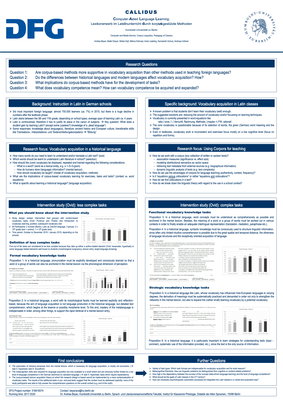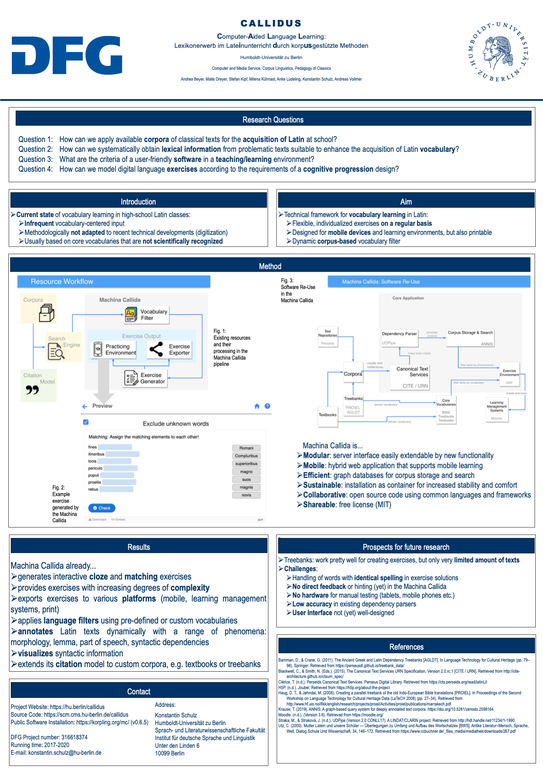CALLIDUS
Callidus is an interdisciplinary research project that delivers new methods of vocabulary acquisition in Latin. Its main purpose is to show the use of corpus-based methods in real teaching environments. Furthermore the project develops a software which is able to use linguistic research tools for creating corpus-based vocabulary exercises.
Vocabulary Acquisition in Latin using Corpus-based Methods
(Computer-Aided Language Learning: Lexikonerwerb im Lateinunterricht durch korpusgestützte Methoden)
In the CALLIDUS project three different departments are working together: the Computer- and Mediaservices, the Didactics of Latin and the Corpuslinguistics. Our common aim is to prove the usefulness of corpus-based methods for teaching Latin and to develop a digital tool as a prototype of corpus-based vocabulary acquisition.
 Machina Callida - Software
Machina Callida - Software
The main research questions
- Are corpus-based methods really more supportive in vocabulary acquisition than other methods used for teaching foreign languages?
- What implications do corpus-based methods have for the development of tasks?
- How can we systematically obtain lexical information about (problematic) texts, esp. in order to use it for language acquisition?
- How can we reuse available corpora and search tools for use in schools?
- What are the criteria of a user-friendly software in a teaching/learning environment?
The status after 2,5 years
On what we worked so far:
- Linguistic terminology: What is a word? What are collexemes? What are collocations? ...
- How to analyse a corpus (semi-)automatically? (POS-Tagging, Stemming, Relations, Test methods for collocations and semantic fields)
- Language acquisition (in general and in Latin)
- Task-based learning, design of corpus-based tasks
- research design (DBR), intervention studies
- AQL / software architecture
- Embedding of open source educational software (H5P)
- Research on text complexity and measuring it in Latin texts
- Research on methods of semantic text analysis
Some of our milestones:
- Pilot study in May/June 2018 with intermediate learners
- Prototype of the software (called Machina Callida) (Aug. 2018)
- Study: Vocabulary acquisition with intermediate learners (Oct. 2018 until Jan 2019)
- Study: Vocabulary acquisition with beginners (Aug. 2018 until June 2019)
- International workshop: Digital Approaches to Teaching Historical Languages (DAtTeL) (28.3.-29.3.2019)
- Software: Machina Callida (fill in the gap and matching exercise, context example, vocabulary comparison, Latin corpus, text complexity, repository, curated vocabulary unit)
- Study: Corpus-based task vs. rote learning task (ongoing)
- Publications and talks
- New layout including documentation of the various contents (Nov. 2019)
- Software: semantic text analysis (Feb. 2020)
- New proposal: Daidalos-Projekt (March 2020) [Abstract]
- Software: technical documentation (April 2020)
- Software: Exercises can be integrated into Moodle (June 2020)
Posters on concept and software:



